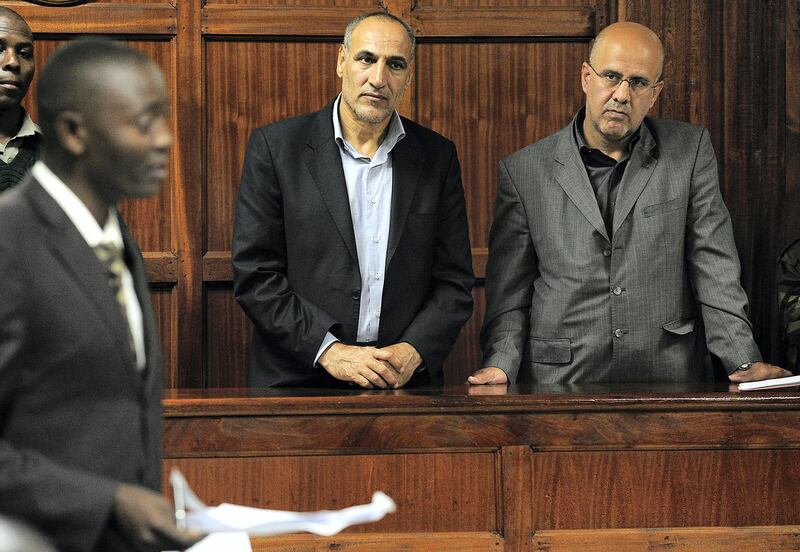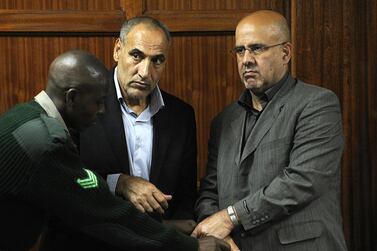Iran's ambassador to Kenya has denied any involvement in a scheme to help free two Iranians imprisoned for terrorism in the East African nation.
Speaking to reporters in Nairobi, Hadi Farajvand denied any links with a Kenyan and a Ghanaian national arrested for allegedly plotting to help the Iranian duo leave the country illegally.
The ambassador said the pair had defrauded him of an undisclosed sum of money after they approached him posing as government representatives.
“They said the [Iranian] terror suspects were going to be freed by the government of Kenya and that they were contacting me on behalf of the Ministry of Interior,” Mr Farajvand told reporters in Nairobi this week.
He later alerted the police, he said.
Police have detained the two suspects – Wesley Kiptanui Kipkemoi and Shemgrant Agyei – on suspicion of attempting to free the two Iranians. The investigation is ongoing.
The Iranian embassy in Nairobi dismissed reports linking the ambassador to the alleged plot.
“The mentioned people in the article approached the embassy claiming that they are acting on behalf of the [Kenyan] interior minister … trying to spoil the name of the good officials and the embassy immediately reported the matter to the ministry,” an embassy statement said.
But the authorities in Nairobi think otherwise.
On Sunday, Kenyan media reported that the ambassador was under criminal investigation over the plot.
In an application filed in court this week, Kenya's anti-terrorism police unit accused the Kenyan and Ghanaian suspects and the ambassador of being “actively involved in an elaborate planning and execution of the escape of the two Iranian nationals".
“Information received so far shows that the three met on diverse dates with a senior diplomat at the Iranian embassy and the main discussion was how to aid the two individuals to escape,” said Duncan Ondimu, a senior state counsel.
Mr Ondimu said the “investigations are complex and require additional time” as the case touched a number of agencies. He said the foreign ministry was also working on the case “due to the fact that the matter involves a senior diplomat at the Iranian Embassy”.
According to media reports, Mr Farajvand was allegedly seeking to connect with high-ranking government officials to help him secure the release of Ahmad Abolfathi Mohammad and Sayed Mansour Mousavi. He reportedly booked a flight with Qatar Airways on February 10 and was supposed to accompany the pair on the journey out of the country.
The two men are thought to be members of the Quds Force – the overseas operations branch of Iran's Islamic Revolutionary Guard.
They were arrested in 2012 while in Kenya as tourists and sentenced to life imprisonment the following year for possession of explosives and plotting terrorist attacks.
According to court filings, the men were charged with three criminal counts, including plotting a terrorist attack.
“On or before 20th June 2012 at Mombasa Golf Course along Mama Ngina Drive in Mombasa jointly with others not in court,” the charge sheet stated, “[they] put an explosive substance (RDX) at the said golf course with the intent to cause grievous harm to golf players.”
Kenya’s diplomatic dilemma
Kenya’s Court of Appeals ordered the release of the two Iranians on January 26, 2018, claiming the evidence against them was circumstantial and they could not be charged with a crime.
However, the government appealed the decision and the Supreme Court ruled that the head of the police was “not in contempt of court for continuing to hold the two suspects”.
Kenya's Daily Nation newspaper reported that police believe it is the public interest to keep them in custody but have "intensified efforts to find other ways to have them freed and flown back to Iran".
According to the newspaper, it is not clear what plan the Kenyan and Ghanaian suspects tried to sell Mr Farajvand or how much he paid them, but what is apparent is that the ambassador was confident the two imprisoned Iranians would somehow be freed.
Analysts say relations between Iran and Kenya are cordial.
However, Kenya has suffered a string of terrorist attacks in recent years blamed on Somali Islamist group Al Shabab, which is allied to Al Qaeda.
There has been no official statement linking any of the attacks to Iran, although several Iranian nationals have been arrested in Kenya for various alleged criminal offences.
For instance, in a separate incident in 2014, a court ordered an Iranian man and woman held under anti-terrorism laws to serve two years in jail or pay a fine after admitting to using fake Israeli passports to enter Kenya, Reuters news agency reported.
“They had been detained on suspicion of planning an attack, but officials did not say if those suspicions were laid to rest,” the agency said.






